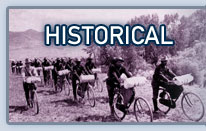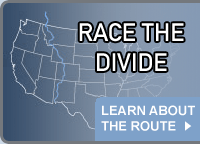To sleep or not to sleep
OK, so I've now recovered from the weekend's efforts enough to have read through the race discussion and have caught up somewhat on all that's happening on the route and in the race. The number of detours is even greater than I'd realised, all the way down into Wyoming, and there are still questions about the amount of snow in Colorado. Then there are the forest fires affecting New Mexico, with at least one rider having to drop out of the race due to the effect of the smoke, and flooding at various points on the route. It sure is a tricky year, and that's before the impact of two grand departs and multiple ITT racers is considered.
Anyway, from the comfort of home it only adds to the race's appeal. As does listening to the call-ins. Hearing what riders sound like is a great insight into their state of mind.
Here are some answers to general questions that have cropped on the discussion forum so far.
SPOT trackers: they can be temperamental. When trees, or steep valley sides, get in the way of a clear line of sight up to the satellite the Trackers tend to stop sending signals and riders have to re-set them. This is particularly the case in Canada and Montana. After the first few days though the tree cover diminishes and signal coverage improves. Things are also helped by the fact riders will have had time to work out how best to mount them, to remember to check to reset them, and just generally get used to using them (and, if they've been in touch with home, to appreciate how important they are for followers).
Sleep deprivation: there's been some debate about whether the benefits of coping without sleep that have seen current southbound leader Jefe Brenham and second-placed Ethan Passant successful in the Colorado Trail Race (Jefe once winner, twice third place, Ethan winner last year and in 2008, and third behind Jefe in 2007) will help in the longer - much longer - TD. It's clear from his tracker that Jefe at least is not letting sleep get in the way of riding at the moment (he stopped for less than four hours at Wise River last night as far as I can make out), while Ethan is getting a few extra hours kip alongside Kurt Refsnider who has the experience of having finished second in the TD two years ago (Kurt stopped for around 7 hours, and has accumulated seven hours more stopped time than Jefe thus far). I won't be so bold as to predict the answer to the question of which strategy will work out best, and my own experience was of such a slower pace as to be largely irrelevant, but the debate can be placed in other contexts: eg: PBP - 1200+km on road - can be done on no sleep, and RAAM riders sleep much less than TD riders, but that's only for up to 10 days, and with support crews to help when your lucidity starts to go, which is perhaps more important than physical deterioration; Ellen Macarthur famously sailed round the world while cat-napping for weeks on end, but is even sailing single-handed as physically demanding as mountain biking for 20+ hours a day?
Bikes: I'll try and give a summary of bike types when i get a moment, but one question from the forum was 'can the race be done on a cross bike?'. It can, and it has - Deanna Adams rode on a fixie cross in 2009.
That's all for now.







Comments
Post new comment